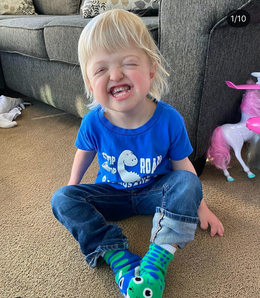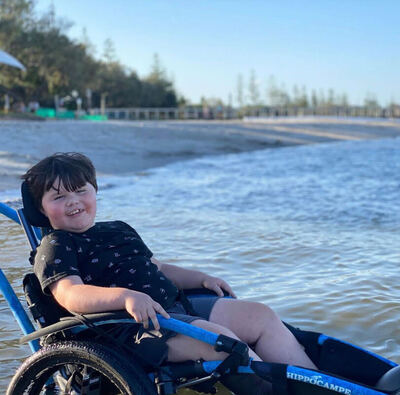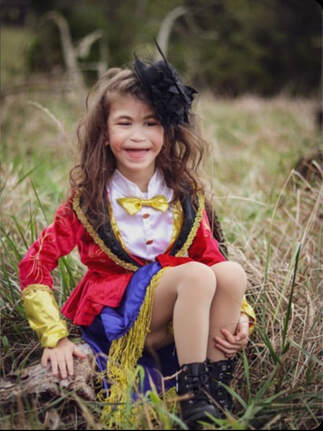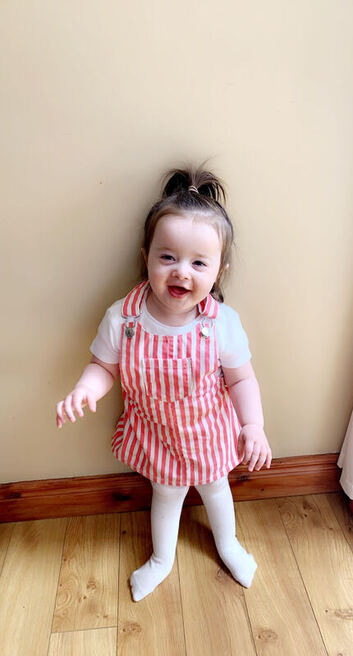|
Meet Amelia! You can always find her playing on the swing and swimming. She has Apert Syndrome, which is a bone fusion condition. However, she is the sweetest little girl and has the superpower to make anyone and everyone smile! I conducted an interview with Amelia's mother, and we talked more about Amelia's diagnosis, her hobbies, and more.
1. To start off, can you tell me a little bit about Amelia (her age, more about her condition(s), etc)? Amelia just turned 4 years old! She has Apert Syndrome which in short is “premature fusion of bones”. It encompasses other conditions such as cleft palate, syndactyly, polydactyly, craniosynostosis, klieppel fiel, and proptosis. 2. What are some major challenges with having the condition Amelia has? A major challenge with having Apert Syndrome is all of the surgeries she has to endure along with gross and fine motor skills. She’s cognitively “normal” but since she has physical differences, she struggles with some everyday activities. 3. What is Amelia's day to day life like and how has it been impacted by her diagnosis (for example, therapy, medicine, etc)? Her day to day activities are pretty average for a normal 4 year old. She gets therapies (occupational and physical) in her preschool and now that she’s past most of her major surgeries, we have approximately 2 physician appointments a month. 4. Are there any medical treatments Amelia follows? The only medical treatment Amelia follows is her therapies! 5. Has Amelia's diagnosis affected the way she learns? I don’t think she’s affected on how she learns. She wears glasses and has a hard time writing, but she’s still a little smarty pants! 6. What would surprise people the most about Amelia? I think the most surprising thing about Amelia is how “Normal” she is! She’s hilarious and is just like any other 4 year old even though she looks different! 7. When someone meets Amelia for the first time, what do you hope they think? I hope they see past her differences. I hope they think how funny and kind she is. 8. What does Amelia like to do for fun/hobbies? Amelia is pretty easy to please. She loves playing with dolls or paw patrol figurines. She likes swimming and playing her Kindle. She enjoys swinging and gymnastics. 9. What is the most important thing for someone to understand about Amelia's condition? The most important thing to understand is that she’s just like any other kid! Treat her with kindness! 10. Has Amelia's diagnosis affected your job? I think Amelia’s diagnosis has definitely affected my job. I treat those with special needs with a little more patience and normalcy then I used to. I also sometimes get anxiety in the OR thinking of what Amelia has to endure. 11. Are there any resources which you recommend if anyone wants to learn more about Amelia's condition(s)? To learn more about apert syndrome you can check out her facebook page “Amelia’s Adventure with Apert Syndrome” or Children's Craniofacial Association. 12. Has the COVID-19 pandemic affected Amelia's day to day life? If so, how? She missed out on therapies because of COVID-19. Other than that, we’ve been doing our best to keep her life as normal as possible! 13. If you or Amelia could tell the world one thing, what would it be? Choose Kind. In a world where you can be anything, be kind.
0 Comments
Meet Harrison! He is a huge fan of Jurassic World and loves to build towering structures with his Legos. Harrison has Duchenne Muscular Dystrophy, a muscle wasting condition which primarily effects boys. However, he still loves a good adventure and strives to live life to the fullest! I conducted an interview with Harrison's parents, and we talked more about Harrison and his diagnosis.
1. To start off, can you tell me a little bit about Harrison (age, more about his condition(s), etc)? Harrison is 7 years old and he was diagnosed with a severe form of Duchenne Muscular Dystrophy when he was 16 months old. Duchenne Muscular Dystrophy is a rare and fatal form of a muscle wasting condition which primarily effects boys, and there is currently no cure for it. 2. What are some major challenges with having the condition Harrison has? Harrison's muscles are getting weaker each day. He lost his ability to walk in July 2019, which is now noticeable in his upper limbs as he struggles to write and lift objects. Duchenne affects every muscle in the body including the respiratory muscles, the lungs, and the heart which is our biggest muscle. 3. What is Harrison's day to day life like and how has it been impacted by his diagnosis (for example, therapy, medicine, etc)? Harrison needs assistance with his personal care and doing activities independently. He attends many medical appointments such as physiotherapy, occupational therapy, a neurologist, a cardiologist, a respiratory team, and more. Harrison still goes to mainstream school with his sister and enjoys playing with Legos, Jurassic World and Youtube. 4. Are there any medical treatments Harrison follows? There is no medication to cure this condition, but we what we can to maintain a good quality of life. Harrison takes pain medication, heart medication, does stretches, and participates in hydrotherapy. 5. Has Harrison's diagnosis affected the way he learns? Harrison's condition means that he is impacted in learning due to being absent from school because of attending medical appointments. In class, he finds writing difficult as holding a pencil is challenging so he is beginning to learn 'speech to text' technology on his iPad. He is able to talk to the iPad and dictate what he wants written down. He enjoys being able to do this and being more independent in his school work. 6. What would surprise people the most about Harrison? Harrison is a very good problem solver. I think this is because he knows he can do just about anything if he puts some thought into it. 7. What does Harrison like to do for fun/hobbies? Harrison loves to go on rides with his sister to the park, swimming, playing with legos, playing PS4 games, and traveling. 8. What is the most important thing for someone to understand about Harrison's condition? Sometimes he has good days and has enough energy and sometimes he has not so good days. Also Harrison's condition is progressive so sometimes when you think you've got a hold on it the condition progresses and we need to change what we're doing. 9. Has Harrison's diagnosis affected your job? I am so busy now managing Harrison's condition, being his caretaker, and going to appointments that I cannot go back to a full-time job. In fact sometimes I think we are approaching a time when I will have to give up work. 10. Are there any resources which you recommend if anyone wants to learn more about Harrison's condition(s)? There are many resources to learn more about Duchenne Muscular Dystrophy. For example, the Save Our Sons Duchenne Australia and the Parent Project Muscular Dystrophy are both great organizations which encourage awareness and support those with the condition. Also, many countries have their own Duchenne Muscular Dystrophy organization. 11. Has the COVID-19 pandemic affected Harrison's day to day life? If so, how? Harrison was impacted by COVID-19 by not being able to access some of his appointments, especially hydrotherapy. This prevented his from having a full body work out in the pool which helps him keep his muscles active. 12. If you or Harrison could tell the world one thing, what would it be? A disability shouldn't prevent you from being part of every aspect of life. Meet Wendy! You can always find her spending time with her German Shepard, playing in the water, or listening to music! Wendy is the only child in the world with a specific chromosomal abnormality, but that doesn't stop her from being the happy and loving child she is. Today, I conducted an interview with Wendy's mother and we talked about Wendy's diagnosis, her day to day life, and more.
1. To start off, can you tell me a little bit about your child (her name, age, more about her condition, etc)? Wendy is an almost 9 year old girl with a one of a kind chromosome abnormality. Her birthday is Oct 8, 2011 and she was born with an unbalanced chromosome translocation between 7p22 & 10p15. As far as we know, she’s the only child in the world with that exact anomaly, so the abnormality/condition doesn’t have a name, but she does have a few other diagnoses such as autism and microcephaly. 2. What are some major challenges with having the condition your daughter has? Our biggest challenge has been dealing with a one of a kind disability. I know all children (and disabilities) have their own ways of being unique, but with Wendy, there are no specialists that can give us any clue as to what her future will or should look like. With some chromosome abnormalities- like Down Syndrome- there are specific growth charts and information about what the child’s life could possibly look like, but in our case, we usually know more than the doctor does because they’ve never seen this before. 3. What is your daughter’s day to day life like and how has it been impacted by your child’s diagnosis (for example, therapy, medicine, etc)? Right now, Wendy’s day to day consists of medication, working on potty training, and homeschooling. Wendy was completely tube fed from birth, but is now eating orally, so since we’ve accomplished the goal of her no longer needing the g-tube, we are now working on getting her potty trained. 4. Are there any medical treatments your child follows? Wendy is treated for many things, like reflux, allergies, and being hyperactive, but our biggest thing right now is trying to fix her immune system. Her IgM count (a type of immunoglobulin) is practically non-existent, which means she’s missing her first defense to fight infections. This means she’s more prone to catching illnesses and being unable to fight them off, which is why we homeschool. She also doesn’t have any immunity to vaccines that she has previously had. We are now working with an immunologist to do treatments every 4-6 weeks (with lab work between) to see if we can build her an immune system. 5. Has your child’s diagnosis affected the way she learns? Wendy is quite delayed developmentally. We’re not sure if that’s due to her chromosome abnormality, the autism, or her microcephaly. The microcephaly means her brain isn’t the size it should be and that could definitely affect her learning, but it could be from any of those or a combination. She’s also nonverbal, but is slowly learning to speak more words. We’ve been using simple sign language since she was a year old to help her communicate. 6. If you or your child could tell the world one thing, what would it be? She’s the happiest child I’ve ever met. Most people see the struggles I write about and assume Wendy’s/we have had a hard or unpleasant life. (I actually started a blog when I was pregnant because we knew about her disability before birth and I was hospitalized for 5 weeks after my water broke until I gave birth, so writing was a way to update everyone all at once and pass the time; the blog eventually ended and I began using Facebook.) Our life isn’t “easy”, but we wouldn’t change Wendy and we believe our struggles have molded us into the family that we are and Wendy is an insanely happy, loving child. 7. What would surprise people the most about your child? I would say other than the fact that she’s got a one of a kind chromosome abnormality (that’s usually surprising to people- finding out she’s the only one in the world like her), her age usually surprises people. Wendy is quite small, but she is not diagnosed with any type of dwarfism. At a year old, she was barely 12lbs wearing 0-3 month size clothing. Now at nearly 9 years old, she’s maybe 35lbs and wearing clothes typical to that of a 4 year old. 8. What does your child like to do for fun/hobbies? Listening to music is by far one of her favorite things to do! Wen also enjoys playing with her German Shepherd, playing house (pretending to cook, do laundry, play with baby dolls), and she loves the water- whether it’s in the bath, pool, lake, whatever! 9. What is the most important thing for someone to understand about your child’s condition? To me, the most important thing is for people to realize she’s a human being. She has thoughts and feelings, just like everyone else, even though she may express herself differently. 10. Has your child’s diagnosis affected your job? Absolutely. I have a degree in veterinary technology, but decided to be a stay at home mom when we had Wendy. Thankfully, at the time of her birth, I wasn’t working; I was pursuing another degree (bachelor’s in business) because my husband/Wendy’s dad was serving in the Army, so it was an easy decision to continue to stay home to be her full time caregiver. We ended up moving back to our hometown when Wen was about 6-7 months old because her dad didn’t want to re-enlist after she was born; their unit did year long deployments every other year and he didn’t want to miss such long periods away from her (especially since we weren’t given an expected lifespan since her condition is one of a kind) and he also didn’t want to leave me alone to deal with her medical issues on my own. 11. Are there any resources which you recommend if people want to learn more about your daughter’s condition? My original blog is still up and I post a lot on her Facebook page. Those are things I’ve written and shared, but also Autism Speaks teaches quite a bit about autism and Chromosome Disorder Outreach and Global Genes are important resources when it comes to rare/one of a kind disorders. My Blog- alwayskissmegnight.blogspot.com Wendy’s Facebook- Facebook.com/BabyWendysJourney Meet Lucy Thompson! She has a rare condition called Zellweger Syndrome, but that doesn't stop her from being the bright, energetic girl she is! Today, I conducted an interview with Lucy's mother, Mrs. McManus, and we talked more about Lucy's condition and how it has impacted her family. 1. To start off, can you tell me a little bit about your child (her name, age, more about Zellweger Syndrome, etc)? Lucy Thompson is one and a half years old and has a rare genetic disorder called Zellweger Syndrome, which is a degenerative disease that can affect many parts of the body but mainly the liver, kidneys, and heart and brain development. A lot of children die within their first year and some may live into early childhood and adulthood depending on how severe his or her condition is. As of now, there is no cure for Zellweger Syndrome and her life is limited due to this. We are lucky that Lucy is doing amazingly at the moment. Lucy also has hypotonia, which is a mild permanent hearing loss, and she wears glasses to help her vision. Ever since I learned about Lucy's diagnosis, I promised to give Lucy the life she deserved and to enjoy every day I have with her. She is always smiling and has the most infectious laugh! She brightens up our darkest days and we just take it one day at a time! 2. What are some major challenges with having Zellweger Syndrome? One of the major challenges is fearing the unknown. We will never know what the future holds for Lucy. I am terrified of what this disease will do to her body, and I hope some day there will be a cure. 3. How did you find out about Lucy diagnosis, and what was your reaction? Did the doctors who diagnose Lucy ever hear about Zellweger Syndrome before? When we got Lucy’s diagnosis, my partner Kris and I were brought into a small room and we were told about Lucy's life limiting condition and that we should go home and enjoy our time with her. The tears streamed from my face, and I couldn’t stop crying. As first time parents, we were trying to cope with Lucy's diagnosis the best we could. Zellweger is so rare that the doctors and her pediatrician only went by what the Internet said. Now, we just take it one day at a time. 4. What is your Lucy's day to day life like and how has it been impacted by your child’s diagnosis (for example, therapy, medicine, etc)? We have appointments all the time whether it’s physio, check ups, or overnight hospital stays - it's just our new normal now. Fortunately, Lucy is currently not on many medications. 5. Are there any medical treatments Lucy follows? Since there is no cure for Zellweger Syndrome, Lucy goes for overnight stays in the hospital every 3 to 4 months to check her blood sugars and to get bloodwork done. 6. Has Lucy's diagnosis affected the way she learns? Lucy is still very young so she is not in school yet. Since her overall development is delayed, it takes her longer to process things. 7. What would surprise people the most about Lucy? I think from hearing about Lucy’s diagnosis and the fact that she’s not walking or talking yet, people think she is worse than what she actually is. She has her own way of getting around and interacting with others, and it is just a little different from what other people may think! 8. What does Lucy like to do for fun? Lucy loves music and is currently a big fan of baby shark! She also loves playing with anything that lights up and makes loud noises. 9. What is the most important thing for someone to understand about Lucy's condition? Don’t judge Lucy for her condition, and give her a chance to do things at her pace. 10. Has Lucy's diagnosis affected your job? Absolutely. I used to be a hairdresser, but after having Lucy, I took an extra leave. When I found out about Lucy’s diagnosis, I made the decision to not go back and spend as much time as I could with my daughter. I am now Lucy’s caretaker and I enjoy every moment of it. 11. If you or Lucy could tell the world one thing, what would it be? This can happen to anyone. Everyone should educate themselves about their underlying genetics before having children. Also, it is so important to not compare your child to other children because no child is the same. |




 RSS Feed
RSS Feed
